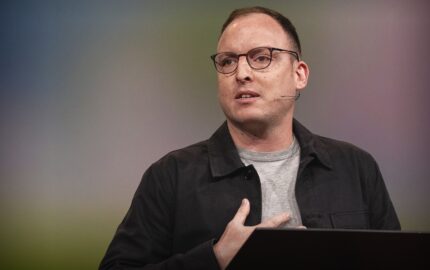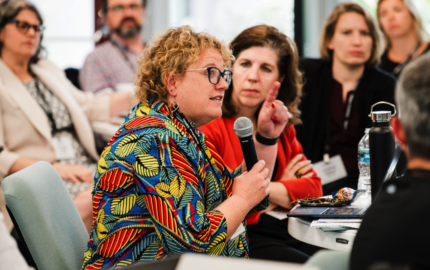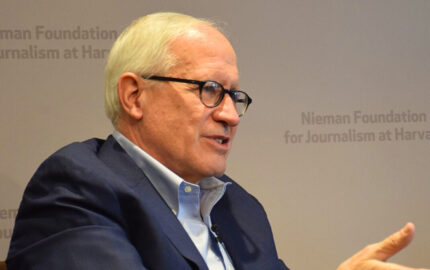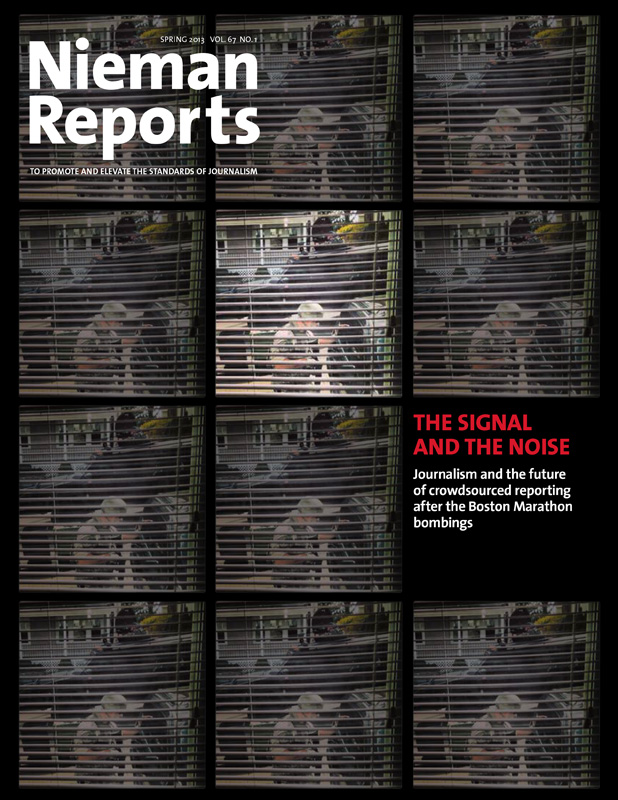
The Signal and the Noise
One tweeter boasted of a "game-changing victory" for crowdsourcing in the early hours of the Boston area manhunt. But what began as a low-grade fever on social media spiked with the wrongful naming of a bombing suspect. All the while, Nieman Visiting Fellow Hong Qu was testing his new tool Keepr as a screen for credibility and posting early results on Nieman Reports as the story unfolded. Qu and journalist Seth Mnookin, who tweeted live from the manhunt, write about how smartphones and their unprecedented power to publish require new journalistic tools and practices, while other Nieman Fellows consider the intersection of social media and journalism in the aftermath of the attac
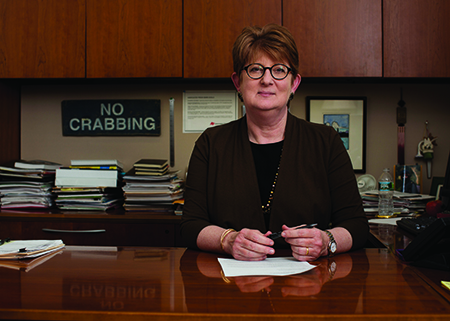
Photo by John Minchello
As executive editor of The Associated Press, Kathleen Carroll oversees a staff of some 2,300 journalists working in more than 100 countries. The news they gather is distributed to the AP’s 1,600 member newspapers in the U.S. and to the rest of the globe through its content licensing business. Since taking the position in 2002, Carroll has expanded the AP’s footprint. In 2012 the AP became the first Western news organization with full media privileges in North Korea. In speaking at the Nieman Foundation with Laura Wides-Munoz, NF ’13, the AP’s Hispanic affairs writer, Carroll emphasized the importance of accuracy, a point she underscored to her staff a few weeks later after the AP made errors in its coverage of the Boston bombings. Edited excerpts:
On the AP’s North Korea bureau
The North Koreans didn’t know anything about us. We took quite a bit of time to explain what our journalism was all about and that we weren’t going to change it. We wanted to come in and cover the Democratic People’s Republic of Korea (DPRK) in our way, and it wasn’t going to be the same way that they cover it. They very highly valued personal relationships, so we worked hard to get to know them over dinners and karaoke. And they waxed us; we were awful singers. But we brought enthusiasm to the effort.
There’s no tradition of open media in the DPRK, so the man on the street or the shop owner or the brewery foreman has no experience with talking to a reporter and knowing where that information is going and what they should say. The challenge for us is to help, just by constantly being there and asking questions, create the culture where people will feel like they can talk to you about things.
We don’t submit our content to anybody. We don’t ever submit our content to censors, with the possible exception of when it is required by the Israeli military. And we label that content as having been submitted. I actually had an interviewer once say to me about our North Korea bureau, “Well, the White House says you might be getting propaganda and you shouldn’t be there.” I remember thinking, “What’s the right amount of time for a pregnant pause for this?”
On the AP’s business model
Around 85 percent of our revenue comes from content licensing to newspapers, news agencies, portals and broadcasters, with US newspapers accounting for about 20 percent of it. And the rest comes from several sources, primarily a newsroom production system and broadcast services businesses. AP diversified starting about 20 years ago. We have the largest newsroom production system for broadcasters in the world and another business that provides services to broadcasters. If you are a television news organization and you don’t want to drag all that stuff to some location, you can send your correspondent, in and we’ll provide all the other services and book the satellite time for you.
Our ad-supported AP Mobile News app is a rapidly growing business for us. It’s not a huge part of our revenue but it’s growing. There are a thousand local news providers that participate in AP Mobile and we’ve done a lot to make that more flexible over time. It used to be that if you looked for Boston news on the mobile app, The Boston Globe and Boston Herald content was together. Now you have a choice. You can choose that you want to read the Globe or you want to read the Herald.
On work/life balance
First you need a good partner, you know? Whoever your life partner is going to be, you’ve got to have somebody who’s going to be tolerant of your schedule and flexible. Steve [Twomey, Carroll’s husband, a journalist and author] and I, for a very long time, managed a “your turn, my turn” kind of a thing. And this job kind of blew that out. But he’s doing book writing now, so it seems to work out.
Look, I started out in this business in 1973 when I got my first job at the Dallas Morning News. God bless them, there was no maternity policy there. I was one of the first girls—because I was 18, so I was a girl—who didn’t have to go through the women’s pages. There were two other women in the city room, and one of them had to have her children while on vacation or quit. It’s so much better now. The women ahead of us didn’t have a choice. It was very hard for them to have families and have careers. I’ve had a choice; you have a choice. Now men are in this conversation, which is fantastic.
I raised the question of work/life balance the other day with Sandy Rowe, who is the retired editor of The Oregonian and is just a wonderful editor, a wonderful mother and grandmother. So, she said, “You know, well, you can’t have it all. You just have to choose.” My variation of that would be, “Well, what’s ‘all’?” You get to define what all is. You can have it all if you define what it is you want. Do you make choices? You bet. But you can do it.
On user-generated content
We’ve never had to skinny back on a piece of user-generated content that wasn’t verified. To be careless with user-generated content is to deliver your reputation to a person who doesn’t work for you and you may not even know. Before we’ll even contemplate putting something on the air, we need to know where the original source is. Seeing a piece of video that’s on a website that is not the originator isn’t good enough. We backtrack to the original source. We try to find the person who took the video and talk with them to verify that they are who they say they are, and where they were, and they can describe where they were when they took it.
Fact checks are great and lots of organizations are doing them, but the most discouraging thing is they don’t make a damn bit of difference to the people whose conduct you’re fact checking.
On being a manager
There are three dirty little tricks that I tell new managers. One is to use your journalistic skills, meaning—ask questions. Two is, after you ask questions, listen to the answers. People sometimes, when they become managers, think that they’ve suddenly been invested with all the answers and they talk all the time. The last is to use your calendar to your benefit. Schedule time for the things that nourish you and that you care about, schedule time to be with people without it being transactional. That doesn’t necessarily have to be lunch. But use your calendar to give yourself discipline.
